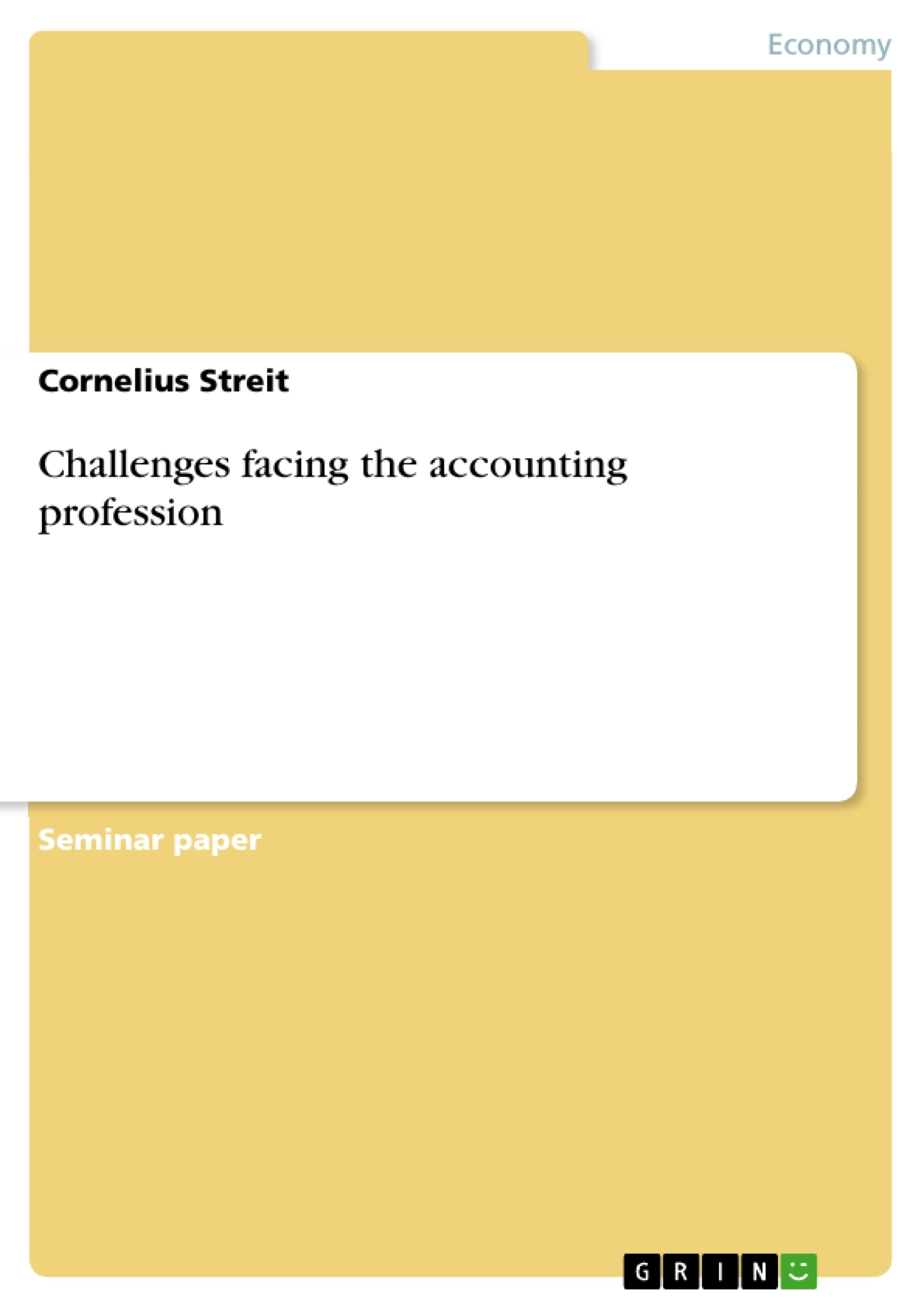The accounting profession has an important significance in today’s business environment and faces many challenges in the upcoming years. This is caused on the one hand by a seemingly unending series of accounting scandals, which grabbed the newspaper headlines over the last few years, and on the other hand by new regulations and accounting standards, which where introduced by regulatory bodies worldwide to prevent frauds and accounting scandals in the future.
Accounting scandals like Worldcom, Enron, Health South, Parmalat and many more have shaken the public’s trust in the accounting profession. Therefore it is vital for the profession to rebuild its credibility and to regain the trust of the market and investors.
Inhaltsverzeichnis (Table of Contents)
- Introduction
- Challenges facing the accounting profession
- New responsibilities
- Sarbanes-Oxley-Act
- Fair Value Accounting
- Other challenges
- Conclusion
Zielsetzung und Themenschwerpunkte (Objectives and Key Themes)
This paper examines the challenges facing the accounting profession in the wake of recent accounting scandals and the implementation of new regulations and accounting standards. It aims to highlight the need for accountants and auditors to adapt and evolve their skills to meet these new demands and rebuild public trust in the profession.
- The impact of accounting scandals on public trust
- The role of accountants as gatekeepers and their responsibility for ensuring proper implementation of accounting standards
- The challenges posed by the Sarbanes-Oxley Act (SOX) and its impact on corporate governance
- The shift towards fair value accounting and its implications for valuation and auditing
- The importance of technological innovation and the need for accountants to adapt to changing business environments
Zusammenfassung der Kapitel (Chapter Summaries)
- Introduction: This chapter sets the stage by discussing the significance of the accounting profession in today's business environment and the challenges it faces due to accounting scandals and new regulations. It emphasizes the need for the profession to rebuild its credibility and regain public trust.
- Challenges facing the accounting profession: This chapter explores various challenges, including the evolving role of accountants as corporate conscience and gatekeepers, the impact of the Sarbanes-Oxley Act, the shift towards fair value accounting, and the need to adapt to technological advancements.
- New responsibilities: This section highlights the increased responsibilities and scrutiny placed on accountants and auditors, emphasizing the need for a broader understanding of financial decisions and their business implications.
- Sarbanes-Oxley-Act: This section discusses the significant impact of the Sarbanes-Oxley Act on the work of public accounting firms and corporations, particularly focusing on Section 404 and its requirements for internal controls and financial reporting.
- Fair Value Accounting: This section examines the transition to fair value accounting, its implications for asset and liability valuation, and the challenges it presents for accountants and auditors in terms of expertise and auditing techniques.
- Other challenges: This section addresses the need for accountants to keep pace with technological advancements and to meet the growing demand for timely, accurate, and transparent financial disclosures.
Schlüsselwörter (Keywords)
This paper focuses on the key issues facing the accounting profession, including accounting scandals, corporate governance, Sarbanes-Oxley Act, fair value accounting, technological advancements, and the need for professional development to adapt to these challenges and maintain public trust.
Frequently Asked Questions
How have accounting scandals affected the profession?
Scandals like Enron and WorldCom have severely shaken public trust, forcing the profession to focus on rebuilding credibility and transparency.
What is the significance of the Sarbanes-Oxley Act (SOX)?
SOX introduced rigorous requirements for internal controls and financial reporting (especially Section 404) to prevent future fraud.
What is Fair Value Accounting?
It is a shift toward valuing assets and liabilities at their current market value, which presents new challenges for auditing and valuation expertise.
Why are accountants called "gatekeepers"?
They are responsible for ensuring the proper implementation of standards and acting as a corporate conscience to protect investors.
How does technology impact the accounting profession?
Accountants must adapt to rapid technological innovations to provide timely, accurate, and transparent financial disclosures in a digital environment.
- Arbeit zitieren
- Cornelius Streit (Autor:in), 2006, Challenges facing the accounting profession, München, GRIN Verlag, https://www.grin.com/document/58650



